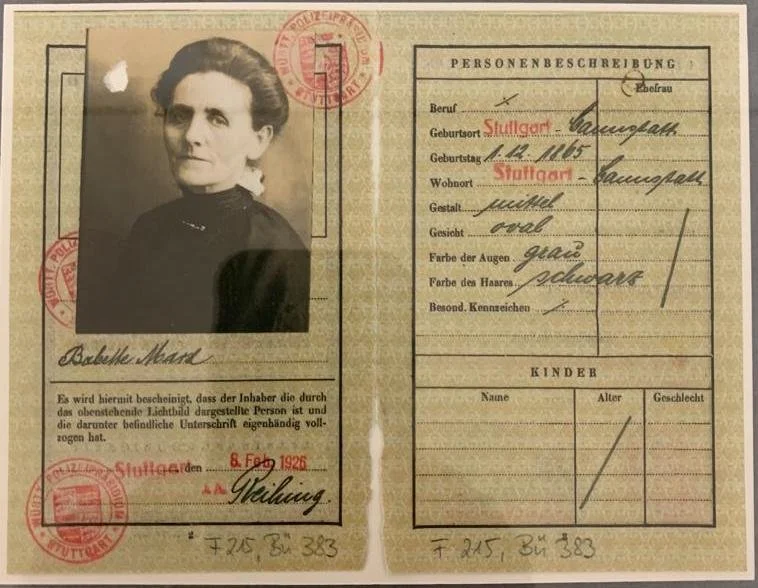MAIN CHARACTER ENERGY
Babette, the 7th sister of the Rothschild family
Married on May 1, 1885 to Eduard Marx, who was 9 years older than her. After 4 children together, Babette was widowed by her beloved husband at the age of only 38 - She raised her children Julius, Leopold, Alfred and Greta alone. In addition, she also managed the family business with a strong hand.
Babette was adored by her brothers, children and grandchildren. As they grew older, her children became protective of her and did everything to make her feel comfortable and proud. She had a great influence on them - she wanted the best and most worthy brides for her precious sons
Babette and Edward Marx with their sons Leopold and Julius. 1898
Babette was a strong, principled, and devoted woman. During World War I, she was awarded the Charlottenkreuz for her unique and significant contributions to the war effort through the family business. Between 1914 and 1918, the company donated a total of 127,243 Mark - a sum far beyond what was typical for companies of similar size.
This was an enormous amount for the time - equivalent to around 2 to 3 million euros today - and it reflects the family’s economic strength, commitment, and unprecedented contribution to Germany’s national effort during World War I.
Beyond the large financial donations, Babette gave what was dearest to her - her beloved sons, who were eager to volunteer for military service.
The eldest son, Leopold, distinguished himself during the war and was awarded the Second Class Iron Cross, the Württemberg Medal of Merit, and the Front Fighter’s Honor Cross.
The second son, Julius, fought on the front lines as a German soldier until he was captured by the French and did not return home until 1919 after escaping captivity. After the war, he joined his older brother in managing the family company.
The third son, Alfred, became a district judge after the war.
Charlottenkreuz 1916
Leopold Marx - 1917
Alfred and Julius - World War I
With the rise of the Nazis to power, a systematic policy began that socially excluded, isolated, and economically exploited the Jews. This policy included bans on holding public offices and practicing certain professions, along with widespread public discrimination.
Starting in 1935, Jews in Germany were officially declared second-class citizens: they were no longer considered German citizens, but merely Jewish subjects.
On December 3rd, a day proclaimed as the "Day of Solidarity of the German People," Babette and her sons - despite their contributions to the nation and their service on the front lines were forbidden from leaving their home between 12:00 p.m. and 8:00 p.m., like all Jews.
Babette and her brothers, Martin and Max Rothschild, who remained in Cannstatt, were required to wear the yellow star. Starting in 1941, they were permitted to shop at only one store in Stuttgart - a two-hour walk each way for Babette, who was already over 70 years old and not allowed to use the tram or even a bicycle.
The Nazi regime’s discriminatory policies against Jews intensified over time: Babette was forced to surrender all her jewelry and silverware. The family’s driver’s licenses and vehicle registrations were revoked, their property, passports, and bank accounts confiscated.
At one point, she was even forced to appear in a Nazi propaganda film intended to "demonstrate" the supposedly good conditions of Jewish families. That footage became the last image of Babette, who was already suffering deeply — enduring hardship, fear, and humiliation.
Until her final moments, Babette remained strong, composed, loyal, and gave everything she had for her family - her brothers, her children, and her grandchildren.
Babette (sitting in the middle) with Greta behind her and the grandchildren - Ephraim, Yehoshua laying hands on Sophie, Walter in his mother's arms (?) and baby Michael
After ensuring the emigration and safety of her children and grandchildren,
In 1942, Babette was sent to the “Castle for Elderly Jews” in Dellmensingen - a waystation before being deported to the Theresienstadt Ghetto with her two brothers, where she perished in October of that same year.
In a moving letter she wrote before her deportation, she shared her pain with her family:
Babette Marx - The main character sits in the middle in black
Babette was the beating heart of the family - “the tree around which family life revolved and where it found its center.” Her home was always open: for celebrations, for mourning, or simply to be together - a place that symbolized closeness, support, and family.
Her birthday, December 1st, remained a special day for her children for many years. Even after her death, as they were scattered across different countries, they would remember one another with a phone call and when distance allowed, even gather to mark the day together.
Babette’s life story is a painful yet inspiring reminder of how a person can live a life of contribution, volunteerism, and responsibility, and still be cruelly crushed and persecuted just a few years later by the very same country they served.
And yet, it is precisely because of her strength, her loyalty, and the warmth she instilled in the family’s heart that we choose to remember the light, the resilience, and the love she left behind. Despite the immense suffering, she stood tall, kept her family united, and inspired them through her example and generosity -her spirit continues to guide us to this day.









